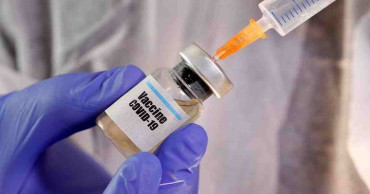Covid vaccine
No vaccine for new Covid sub-variants, 3.2 million old doses in stock
Bangladesh has no vaccine available for the newly detected sub-variants of the Omicron strain of Covid-19, although 3.2 million doses of older vaccines remain in stock with a few months’ shelf life, according to the Directorate General of Health Services (DGHS).
Covid-19 infection rates have seen a recent uptick across the country over the past month.
Data from the Institute of Epidemiology, Disease Control and Research (IEDCR) shows that out of 1,409 samples tested in May, 134 were positive — an infection rate of 9.51 percent, the highest recorded from January to May 2023.
Genome sequencing of positive samples confirmed the presence of new Omicron sub-variants XFG and XFC, previously undetected in Bangladesh.
The DGHS noted that these new sub-variants exhibit higher transmissibility compared to previous strains. Between January and June this year, seven Covid-related deaths were reported — all occurring in the first 17 days of June.
Fresh COVID sub‑variant wave hits Bangladesh; experts urge vigilance
Patients are again being admitted to the specialised Covid hospital in Mohakhali, and the demand for tests is rising.
This resurgence has prompted questions regarding the availability and efficacy of vaccines.
Despite the rising infections, no new vaccines specifically targeting the sub-variants have been imported and no vaccine committee has yet been formed.
Halimur Rashid, Line Director of the Communicable Disease Control (CDC) unit at the DGHS, told UNB, “In total, there are around 3.2 million doses of vaccines.
According to the 2024–25 US-CDC guidelines, the available vaccines are applicable for Omicron variants. Besides, the previously used vaccines in Bangladesh can still be administered.”
When asked whether any new vaccines have been brought in to tackle the sub-variants, Rashid said, “No new vaccines for the sub-variants have arrived so far. However, the process of procurement is ongoing. A vaccine committee will be formed soon to make a prompt decision.”
Despite the rise in cases, public interest in vaccination remains low. “There are various rumours about vaccines that have no scientific basis,” said Rashid, adding, “People can still get vaccinated by visiting designated centres.”
Official records show that only 43 people received a Covid-19 vaccine in the first three months of this year, with 7 receiving the first dose, 5 the second dose, 16 the booster dose, and 15 a fourth dose.
Data also indicates that those who have never received any Covid vaccine are the least likely to seek vaccination now.
Health authorities maintain that mass vaccination is not currently necessary. Only certain vulnerable groups are being advised to get vaccinated.
Speaking at a recent press conference, DGHS Director General Dr Abu Jafar stated that individuals who are frontline workers involved in public-facing jobs and those with compromised immune systems should receive the vaccine if they have not yet done so.
Mask prices double as COVID infections surge in Bangladesh
He also advised that people over 60, those with comorbidities and those with weakened immunity should take another dose six months after their last jab.
In addition to vaccines, the DGHS has already begun distributing detection kits to hospitals nationwide and is preparing hospital beds for potential admissions.
When asked whether the current rise in cases warrants public alarm, Professor Mahmuda Yasmin of the Department of Microbiology at the University of Dhaka said, “Although the infection rate is increasing, the situation is not yet alarming.”
Experts, however, stress the importance of early preparedness to combat the spread of new sub-variants. They note that with sufficient preparation, both infection and mortality rates can be minimised.
According to DGHS data, more than 29,500 people have died of Covid-19 in Bangladesh to date.
Although the fatality rate remains low compared to the number of detected cases, the virus continues to pose a public health concern.
Since the beginning of the pandemic, Bangladesh has reported a total detection rate of 13.05 percent, with a recovery rate of 98.42 percent and a mortality rate of 1.44 percent per 100 confirmed cases.
8 months ago
Citizens aged above 60 to get 4th dose of Covid vaccine: Health Minister
Citizens aged above 60 will get the fourth dose of Covid-19 vaccine, said Health Minister Zahid Maleque on Monday.
Prime Minister Shiekh Hasina approved it and people can get vaccinated during the ongoing seven-day campaign from any centre, the minister told reporters at the Secretariat.
Read more: 7-day Covid-19 vaccination campaign kicks off Thursday
Around 98 percent of the adult people have jabbed against the Covid-19, he said. “Besides, students are also being administered with the vaccine.”
So far, 14 crore people have been vaccinated with the first dose while more than 12 crore people with the second dose and six crore with the booster dose against Covid-19, he added.
Earlier, the National Technical Advisory Committee (NTAC) on Covid-19 recommended administering the fourth dose of Covid vaccine to contain the further spread of the virus, said Dr Shamsul Haque, director of the vaccination program of the Directorate General of Health Services (DGHS), on November 30.
Read more: COVID-19: US vaccine donations to Bangladesh exceed 100 million
It recommended bringing front liners, citizens aged above 60 and the pregnant women under the fourth dose vaccination progamme in the first phase, he said.
The seven-day special vaccination campaign against Covid-19 was launched on December 1 that will end December 7.
Around 90 lakh people will be vaccinated under this campaign where 17,116 teams will provide the service.
3 years ago
Children aged 5-12 to be vaccinated soon: Health Minister
Children aged between five and 12 will be vaccinated against Covid-19 soon, said Health Minister Zahid Maleque on Tuesday.
Birth certificate is required to get registered for Covid vaccine, he said.
He was speaking at the inaugural and certificate distribution ceremony of the "Certificate Course on Neurodevelopment Disorder" organised by the Institute of Paediatric Neurodisorder & Autism (IPNA) at Bangabandhu Sheikh Mujib Medical University (BSMMU).
Read:Children aged 5-12 to be vaccinated by June: Health Minister
“Although several countries of the world have started vaccinating their children, we have not yet been able to vaccinate children. Because, we didn’t receive approval from the World Health Organization (WHO),” he said.
“Now we have got the approval, so we will start the programme very soon.”
He said they have also received the suitable vaccine for children.
There are about 1.5 crore children and it will take time to vaccinate them all. “So get your children registered fast to get them vaccinated,” he urged the parents.
The minister said they have a plan to manufacture vaccine in the country and already selected a land in Gopalganj in this regard. “We will manufacture all the vaccines there.”
3 years ago
Covid-19: Over 1 lakh Rohingya children vaccinated in Bangladesh
More than 110,000 Rohingya children and adolescents living in the camps in Cox’s Bazar have received their first jab against COVID-19, said the UN refugee agency on Sunday.
They have been vaccinated as part of the National Vaccination Plan from the government of Bangladesh with support of UNHCR, WHO, UNICEF and other humanitarian partners.
“Bangladesh is one of the first countries worldwide to vaccinate refugee children and adolescents,” said Johannes Van Der Klaauw, UNHCR Representative in Bangladesh.
Also read:WB to provide Tk 255 cr as food aid to Rohingyas: State Minister
3 years ago
CDC urges Pfizer booster for children ages 5 to 11
Kids ages 5 to 11 should get a booster dose of Pfizer’s COVID-19 vaccine, advisers to the U.S. government said Thursday.
The Center for Disease Control and Prevention quickly adopted the panel’s recommendation, opening a third COVID-19 shot to healthy elementary-age kids — just like what is already recommended for everybody 12 and older.
The hope is that an extra shot will shore up protection for kids ages 5 to 11 as infections once again are on the rise.
Also read:N. Korea's low death count questioned amid COVID-19 outbreak
“Vaccination with a primary series among this age group has lagged behind other age groups leaving them vulnerable to serious illness,” said CDC Director Dr. Rochelle Walensky, in a statement.
“We know that these vaccines are safe, and we must continue to increase the number of children who are protected,” she said.
Earlier this week, the Food and Drug Administration authorized Pfizer's kid-sized booster, to be offered at least five months after the youngsters' last shot.
The CDC takes the next step of recommending who actually needs vaccinations. Its advisers debated if all otherwise healthy 5- to 11-year-olds need an extra dose, especially since so many children were infected during the huge winter surge of the omicron variant.
But the U.S. now is averaging 100,000 new cases a day for the first time since February. And ultimately, the CDC's advisers pointed to growing evidence from older kids and adults that two primary vaccinations plus a booster are providing the best protection against the newest coronavirus variants.
“This always perhaps should have been a three-dose vaccine,” said Dr. Grace Lee of Stanford University, who chairs the CDC’s advisory panel.
The booster question isn't the hottest vaccine topic: Parents still are anxiously awaiting a chance to vaccinate kids under 5 — the only group not yet eligible in the U.S.
Dr. Doran Fink of the Food and Drug Administration said the agency is working “as rapidly as we can” to evaluate an application from vaccine maker Moderna, and is awaiting final data on the littlest kids from rival Pfizer. The FDA's own advisers are expected to publicly debate data from one or both companies next month.
For the 5- to 11-year-olds, it’s not clear how much booster demand there will be. Only about 30% of that age group have had the initial two Pfizer doses since vaccinations opened to them in November.
CDC adviser Dr. Helen Keipp Talbot of Vanderbilt University said health authorities must put more effort into getting youngsters their initial shots.
“That needs to be a priority,” she said.
Also read: Shanghai to reopen subways in easing of COVID restrictions
Thursday's decision also means that 5- to 11-year-olds with severely weakened immune systems, who are supposed to get three initial shots, would be eligible for a fourth dose.
Pfizer and its partner BioNTech currently make the only COVID-19 vaccine available for children of any age in the U.S. Those ages 5 to 11 receive a dose that’s one-third the amount given to everyone 12 and older.
In a small study, Pfizer found a booster revved up those kids’ levels of virus-fighting antibodies — including those able to fight the super-contagious omicron variant — the same kind of jump adults get from an extra shot.
Vaccines may not always prevent milder infections, and the omicron variant proved especially able to slip past their defenses. But CDC cited data during the omicron surge that showed unvaccinated 5- to 11-year-olds had twice the rate of hospitalization as youngsters who got their first two doses.
Health authorities say for all ages, the vaccines are still offering strong protection against COVID-19's worst outcomes, especially after a third dose.
Some especially high-risk people, including those 50 and older, have been offered the choice of a second booster, or fourth shot — and the CDC on Thursday strengthened that recommendation, too, urging anyone who's eligible to go ahead and get the extra dose.
Still to be decided is whether everyone will need additional shots in the fall, possibly reformulated to offer better protection against newer coronavirus variants.
3 years ago
Bangladesh ranks top among the countries to receive free Covid vaccine from WHO: Health minister
Bangladesh has been the largest recipient of Covid-19 vaccines worth about Tk 20,000 crore free from the World Health Organization (WHO), said Health Minister Zahid Maleque on Wednesday.
“At the same time, we have been able to vaccinate about 98 per cent people of the targeted population against Covid-19 in the country, which is about 75 per cent of the total population,” the minister said this while addressing a meeting of Awami League members at Manikganj district on the occasion of Eid-ul-Fitr.
Also read: Children aged 5-12 to be vaccinated by June: Health Minister
“By the grace of Allah, under the guidance of Prime Minister Sheikh Hasina, we have been able to control Covid situation today,” he said.
Maleque further said this time Eid is being celebrated in full swing in the country following continuous downtrend in the Covid infection rate due to the mass vaccination.
Also read:Ensure wearing masks, social distance, health guidelines amid Covid surge in world: NTAC
He said, “The country's economy is moving on with six per cent GDP growth.”
In countries where Covid situation is out of control, the economy is in recession, he said.
“Bangladesh is one of the countries with the strongest economy in the world,” he added.
3 years ago
Pfizer asks US to allow 4th COVID vaccine dose for seniors
Pfizer and its partner BioNTech asked U.S. regulators Tuesday to authorize an additional booster dose of their COVID-19 vaccine for seniors, saying data from Israel suggests older adults would benefit.
Currently the U.S. urges two primary shots followed months later by a booster dose for everyone age 12 and older. The new application seeks to add a fourth shot only for the over-65 population that has been hit hardest by the pandemic.
The Food and Drug Administration and the Centers for Disease Control would have to approve the request. If so, a key question would be how soon seniors would be advised to roll up their sleeves.
While authorities say the vaccinations continue to offer strong protection against severe illness, they haven’t held up as well against milder infections especially those due to the omicron mutant. With COVID-19 cases finally plummeting after the intense omicron surge, public health experts are starting to look ahead to what next steps might be needed — if a new variant crops up or, barring that, whether to try shoring up coronavirus protection in the fall at the same time people get flu vaccinations.
Read: Global Covid cases top 461 million
Speaking to CBS’ “Face the Nation” on Sunday, Pfizer CEO Albert Bourla signaled the company’s plans.
“The protection that you are getting from the third, it is good enough, actually quite good for hospitalizations and deaths. It’s not that good against infections,” he said. “But we are just submitting those data to the FDA and then we will see what the experts also will say outside Pfizer.”
The U.S. booster campaign was based on evidence that the shots’ effectiveness, particularly against milder infections, was waning about six months after the last dose. Calls for a third shot grew once it became clear the vaccines weren’t as strong against the omicron mutant as they were against earlier versions of the virus.
Many scientists say the ultimate goal of vaccination is to prevent severe illness, not mild infections, and early CDC data show the shots still are doing a good job at that. During the omicron wave, effectiveness against hospitalization was 91% in people who had gotten their booster two months earlier, and 78% by the fourth month after that booster.
Pfizer based its new application on data from Israel, which already was offering a second booster to people age 60 and older and health care workers.
While some early data left unclear just how much benefit another shot offered — or for how long — Pfizer said Tuesday that an analysis of health records of more than 1.1 million Israeli seniors showed confirmed infections were two times lower and rates of severe illness were four times lower among those who got two boosters instead of just one.
Read: Symptoms of Omicron: How is it different from Covid-19 Variant Delta
Pfizer also cited an ongoing study of healthcare workers that tracked a jump in virus-fighting antibodies after getting the additional booster.
In the U.S. so far, a fourth dose is recommended only for people with severely weakened immune systems, who need three doses to begin with for the best chance at any protection.
3 years ago
UK donates 1mn more Oxford-AstraZeneca vaccine doses to Bangladesh
The United Kingdom has donated 1 million more doses of the Oxford-AstraZeneca vaccine to Bangladesh to fight off Covid-19.
The vaccine consignment arrived in Bangladesh on February 23, said the British High Commission in Dhaka on Wednesday.
Read: US donates another 10mn doses of Pfizer’s vaccine
While welcoming the vaccines donation from the UK, British High Commissioner to Bangladesh Robert Chatterton Dickson said, “We welcome the arrival of 1 million doses of the AstraZeneca vaccine from the UK to Bangladesh. This bilateral donation adds to the 4 million doses that the UK donated through COVAX last year.”
He said this support from the UK takes them one step ahead to defeat the pandemic and further strengthens their commitment to stand with the people of Bangladesh to recover faster and build a healthier and prosperous future.
The latest bilateral donation from the UK will reinforce Bangladesh’s fight against the coronavirus pandemic and the country’s economic recovery, the High Commission said.
Prior to this, the UK donated over 4 million doses of the AstraZeneca vaccine to Bangladesh in December 2021 through COVAX facilities.
Complementing the vaccine donations, the UK’s Foreign Commonwealth and Development Office (FCDO), through its delivery partners, created an enabling environment for the Government of Bangladesh to accelerate and expand the vaccination program as well as reduce the transmission of the infection especially among the low-income people.
Read: Dhaka calls for sharing technology, know-how of Covid-19 vaccine production
This includes support for on-line vaccine registration for the disadvantaged, raising awareness, additional healthcare provider and technician support, training of health workers including vaccinators, and transporting vaccines to the districts as well as to the schools across the country.
Since the pandemic started, the UK government has reprioritised more than £55.9 million to fund Bangladesh’s National Preparedness and Response Plan to tackle COVID-19 including support for the Rohingya refugees and the host communities.
4 years ago
Khaleda to receive third dose of Covid vaccine today
BNP Chairperson Khaleda Zia will receive the third dose of Covid-19 vaccine at Sheikh Russel Gastroliver Institute and Hospital on Wednesday afternoon.
She is scheduled to leave her Gulshan residence around 3pm for the hospital to receive the vaccine shot, said her media wing member Sayrul Kabir Khan.
“Madam (Khaleda) got SMS to take the third or booster dose of the Covid vaccine. All arrangements have been made so that she can receive it smoothly in the afternoon," her personal doctor AZM Zahid Hossain told UNB.
Earlier on July 19 last year, Khaleda took the first dose of Moderna Covid-19 vaccine while the second dose of the same on August 18 at the same hospital.
On April 11, the 76-year-old BNP chief tested positive for Covid-19 and she was admitted to Evercare Hospital on April 27.
She tested negative for Covid-19 on May 8, 27, days after she had been infected with the deadly virus.
Read: BNP leaders upset over Khaleda’s recovery: Dr Hasan
Later, the BNP chief registered online through Surokkha website for getting the vaccine on July 8.
Khaleda, a 76-year-old former prime minister, has been suffering from various ailments, including liver cirrhosis, arthritis, diabetes, kidney, lung and eye problems.
She was last admitted to Evercare Hospital in Dhaka on November 13 last year where she was diagnosed with liver cirrhosis.
On February 1, she returned home after an 81-day stay in the hospital as she was suffering from inertial bleeding caused by the liver cirrhosis problem.
Her medical board members said Khaleda immediately needs to go abroad for better treatment of her liver cirrhosis problem.
On behalf of her family, Khaleda's younger brother, Shamim Iskander, submitted an application to the Home Ministry on November 11 urging the government to allow her to go abroad for better treatment.
The government still did not dispose of the application while the ministers are saying the BNP chief has no scope to go abroad until she files a fresh application returning to jail.
Read: Khaleda conferred with 'Mother of Democracy' award
Amid the coronavirus outbreak, the government temporarily freed Khaleda Zia from jail through an executive order suspending her sentences on March 25 last year with conditions that she will stay in her Gulshan house and will not leave the country.
4 years ago
10 million vaccine shots to be administered on Feb 26: Health Minister
The government has taken an initiative to administer at least 10 million Covid-19 vaccine doses on February 26 to achieve the target of vaccinating 90 percent of people in the country, said Health and Family Welfare Minister Zahid Malik on Thursday.
To implement the initiative, the Health and Family Welfare Minister has already sat in several meetings with the officials of his ministry and the Directorate General of Health Services, said a PID handout.
The meetings expressed optimism that if 90 percent of the targeted people could be brought under the vaccination coverage, both the infection and death rates would decline .
In the meetings, a number of plans were taken to implement the fresh inoculation drive.
Read: Covid in Bangladesh: 20 more die as positivity rate stands at 10.24 %
As per the plans, at least 10 million people from the floating communities who have not yet been vaccinated yet, will be selected in upazilas, municipalities and city’s wards, community centres or other places designated by the government, in order to bring them under the vaccination coverage.
Some 6.55 million vaccine shots will be provided in different levels on the day (February 26), including 4.14 million doses in 13,800 wards in the upazilas, 0.324 million doses in 1068 wards in the municipalities, 2.0925 million shots in 465 wards in cities.
Read: Prepare universal pension scheme for all: Hasina
Besides, 3.5 million vaccine doses will be given to special communities including workers in various factories, markets, restaurants, boats, launches and ships, brick kilns and other floating communities.
No vaccine registration or birth registration certificate will be required to get vaccinated against Covid on February 26.
4 years ago





.jpg)










